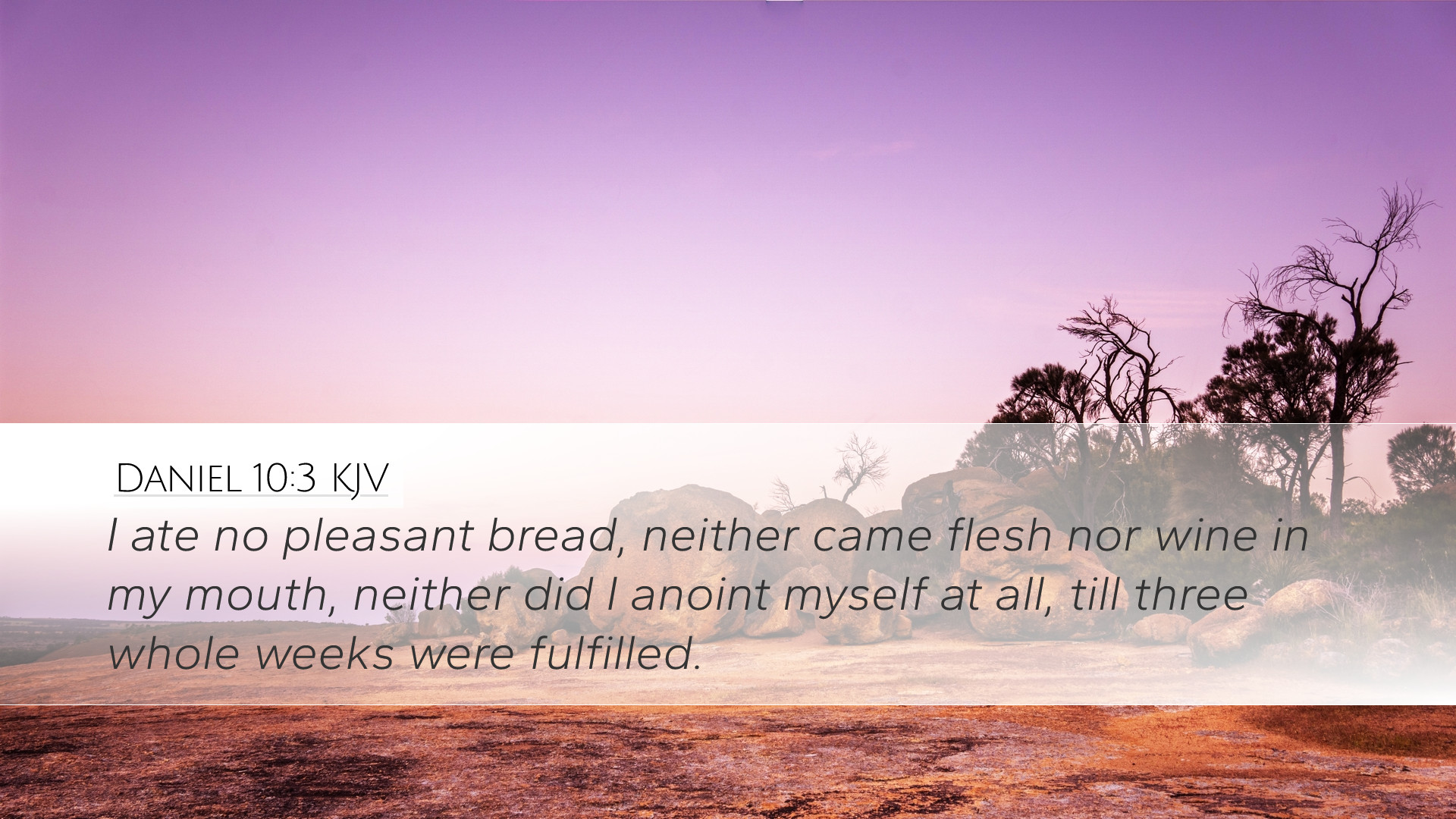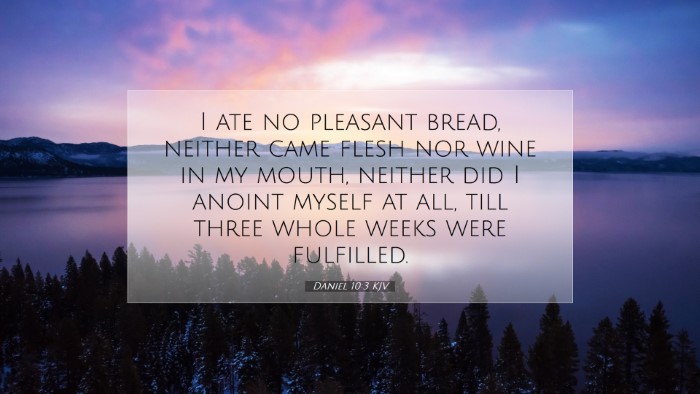Old Testament
Genesis Exodus Leviticus Numbers Deuteronomy Joshua Judges Ruth 1 Samuel 2 Samuel 1 Kings 2 Kings 1 Chronicles 2 Chronicles Ezra Nehemiah Esther Job Psalms Proverbs Ecclesiastes Song of Solomon Isaiah Jeremiah Lamentations Ezekiel Daniel Hosea Joel Amos Obadiah Jonah Micah Nahum Habakkuk Zephaniah Haggai Zechariah MalachiDaniel 10:3
Daniel 10:3 KJV
I ate no pleasant bread, neither came flesh nor wine in my mouth, neither did I anoint myself at all, till three whole weeks were fulfilled.
Daniel 10:3 Bible Commentary
Commentary on Daniel 10:3
Verse Text: "I ate no pleasant bread, neither came flesh nor wine in my mouth, neither did I anoint myself at all, till three whole weeks were fulfilled."
Introduction
This verse occurs in the context of a profound vision experienced by Daniel, representing a deep spiritual state characterized by prayer, fasting, and mourning. The significance of Daniel's actions can be understood through a holistic examination of the historical, theological, and ethical implications suggested by various public domain commentaries.
Historical Context
Daniel 10 is set in the time of the Persian Empire, where Daniel, an Israelite captive, had served in high positions. The period of mourning and fasting he undertook was likely influenced by concerns over the state of Israel and the oppression felt by the Jewish people. Understanding Daniel's situation enhances our appreciation of his actions.
Matthew Henry's Insights
Matthew Henry notes that Daniel's fast was voluntary and deliberate. He dedicated three weeks, a time of both spiritual and physical abstinence. This method to seek God’s favor reflects a deep desire for revelation and guidance regarding the future of his people.
Reflection on Fasting
- Fasting is presented as a tool for drawing closer to God.
- Henry emphasizes the necessity of seeking God earnestly when faced with dire situations, as Daniel did.
Albert Barnes' Commentary
Albert Barnes highlights the significance of the term "pleasant bread." He explains that Daniel abstained from all forms of luxurious food, indicating a time of purification and humility before God. He notes that Daniel’s actions delineate a seriousness about his spiritual quest.
Spiritual Significance
- The act of not anointing himself symbolizes a state of mourning.
- Daniel's fast reflects the idea that physical sustenance is less important than spiritual enlightenment during challenging times.
Adam Clarke's Interpretation
Adam Clarke provides a detailed examination of the phrase "till three whole weeks were fulfilled." He posits that the three-week duration signifies a period set apart for divine purposes—a time of personal and communal introspection.
Theological Implications
- Clarke reminds readers of the importance of persistence in prayer and fasting.
- The continuity of Daniel’s dedication highlights the persistence required in seeking God’s response and guidance.
The Nature of Daniel’s Fast
The fasting outlined in Daniel 10:3 can be categorized as a form of lament. Such fasts are frequently recorded in the Bible, serving as acts of contrition and humility. Fasting here is not merely abstinence from food; it symbolizes a deeper yearning for divine action and understanding.
Purpose of Fasting
- To express sorrow for sin and needs of the people.
- To seek earnest prayer for Israel’s restoration and deliverance.
Practical Applications for Today
Daniel's example challenges contemporary readers, especially pastors and theologians, to engage in fasting and prayer with a sincere heart. It serves as a reminder that physical sacrifices can lead to deeper spiritual revelations.
For Pastors and Church Leaders
- Encourage congregations to dedicate time for fasting and prayer when facing communal challenges.
- Emphasize the importance of seeking God earnestly, as demonstrated by Daniel.
For Students and Scholars
- Investigate the significance of biblical fasting across different texts.
- Consider the role of personal sacrifice in the spiritual life of a believer.
For Theologians
- Analyze the implications of mourning and fasting within the broader context of biblical theology.
- Reflect on the transformative capacity of spiritual disciplines such as fasting in the life of a believer.
Conclusion
Daniel 10:3 serves as a pivotal verse that encapsulates the essence of seeking God through fasting and prayer. The insights from Henry, Barnes, and Clarke illuminate the profound motivations behind Daniel's actions and their implications for contemporary faith practice. In this light, readers are called to embrace such disciplines as a pathway to divine engagement, guidance, and revelation.


